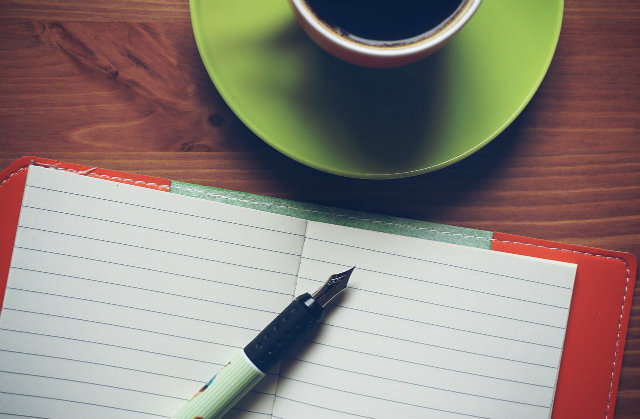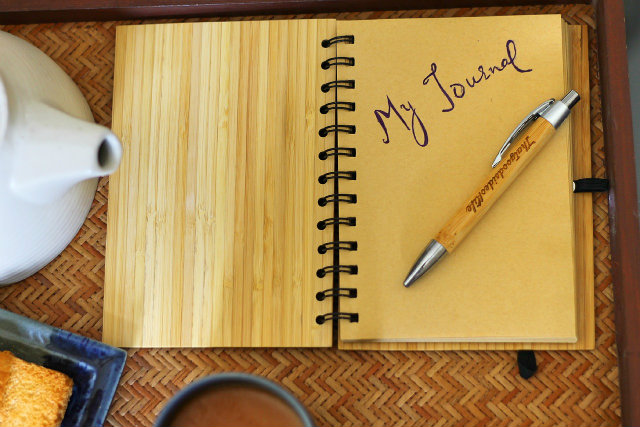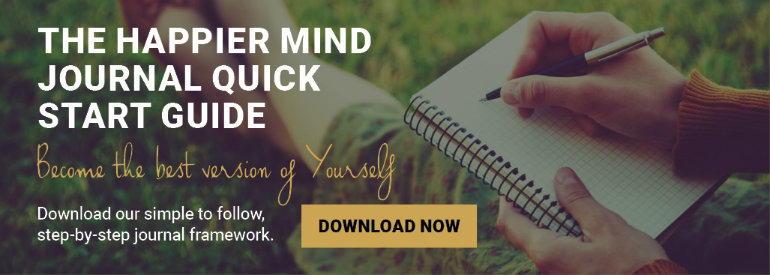 Reading Time: 6 minutes
Reading Time: 6 minutesIf you’ve been working to improve your whole self — to be more grateful, positive, and mindful; to feel your best physically and emotionally; and to gain control over your life — then adopting a daily journal is the single most important step you can take to get started.
Life Is Busier Than It’s Ever Been Before
If you’re like the rest of us, you hit snooze a few times in the morning and then crawl out of bed in zombie mode, rushing to get ready for the day. You get to work, fueled by entirely too much caffeine, to find Post-it notes everywhere and deadlines slipping away too quickly to catch.
You struggle through the day, doing enough to stay afloat — which is a whole lot — then you do it all over again at home, where dishes, laundry, and bills (and maybe even a side gig) are waiting.
And by the time your head hits the pillow, you wonder, “What have I accomplished today?” Despite the fourteen-hour grind, perhaps it feels like you accomplished nothing meaningful or nothing at all. And aren’t the two equally dismal?
Here’s our advice to you: stop.
Simply stop. Stop to breathe, to reflect, to smell the coffee, to plan your day. Stop leaving the outcome of your limited time on Earth to chance. Stop allowing your schedule to determine who you are and steal your legacy.
Breaking free from auto pilot will not happen overnight. Don’t expect it to. It’s going to take one specific tiny daily commitment, a single day at a time. You’re going to see minuscule improvements that begin to change the way you feel and behave throughout the day.
And that tiny daily commitment?
Journaling.
“How can journaling change my life?” you may be asking.
It can change your life by shifting your focus back to life. Across our lifespans, we are given limited moments to do what matters most and most of us are not even asking ourselves what does matter most. We’re just doing what life requires of us every moment of every day instead of asking, “What do I require?”
The result of this auto pilot: low energy, lack of fulfillment, depression, anxiety, weight gain, fatigue, frustration, and more. Does this sound familiar?
Where Does Journaling Come In?
Morning journaling gives you the opportunity to re-center at the start of each day and set your goals and priorities. It allows you to start your day intentionally, driving the train instead of riding it. It encourages you to reflect on your choices and the results of those choices, which moves you to choose better every single day.
The practice of journaling forces you to make time for the things that don’t steal your time naturally throughout the day, like gratitude, health, wellness, relationships, and peace.
And, as Buddha teaches, what you think you become. So, as you think about your nutrition choices, your physical activity, your gratitude, your relationships, and a peaceful life, so it becomes, like a self-fulfilling prophecy. Not overnight, of course, but over tiny daily changes that lead to transformation of the body of mind.

How Do You Find the Time to Journal?
You choose to find the time. Any of these ways — or any other way you can dream of — work just fine if you commit to this habit:
- Set your alarm fifteen minutes earlier each morning.
- Choose to sit down at the coffee shop instead of driving through.
- Put it on your calendar so it receives the same attention as a dentist appointment or performance review.
- Do it during your lunch break.
- Create a reward system: no coffee in the morning or glass of wine at night until your journaling is done.
- Put it on a list (crossing it off is oh-so-satisfying).
- Put a note on your steering wheel.
- Keep your journal on your nightstand and get it done before you get out of bed in the morning or fall asleep at night.
- If you take public transportation, do it during your morning commute.
The sky is the limit, but the most important thing to remember is that you simply must choose to do it. Period. Without excuses. The good news? When you start your day with intention, you’ll find you have more time than ever before because you begin choosing not to spend your moments on things that don’t matter.
Now: How to Journal
Now that you know how journaling can impact your life and you have some ideas on how to fit it into your busy schedule, let’s talk about the how of the act itself.
If you’re reading this and picturing a notebook full of cursive, detailing each day’s events, that’s one version of a journal and that’s what I first envisioned when I began journaling, as well. Journals like that do serve a purpose: they force you to take time to reflect on your day, which can bring up feelings of love, gratitude, and sometimes healthy remorse that drives better choices in the future.

But when I talk about journaling, I’m talking about a combination of a little bit of reflection and a little bit of intention, which is quite different in practice.
Here’s an example of the kind of journaling that supports your Whole Life Challenge:
- Take a moment to reflect on yesterday. How was your nutrition? How was your physical activity? Did you achieve your daily goals? How did you feel?
- Take a moment to plan for today. What does your schedule look like? Is there anything that doesn’t support today’s intention and if so, can you get it off your calendar? What would you like to achieve today? Which few small action items will help you achieve it? What are you grateful for?
The most important thing to remember when you’re working on your daily journal is that striving for perfection always ends in failure. Don’t aim your sights at zero carbs, sixty minutes of vigorous physical activity, no negative thoughts, and a gallon of water. It might happen once — it might even happen twice — but when it doesn’t happen, it’s going to not happen bad. Like six-family-sized-bags-of-chips, twelve-hours-in-bed, angry-at-loved-ones-bad.
Instead, if you’ve learned you can have an occasional sweet without feeling bad or gaining weight (and that’s exactly what journaling can help you find out), then build that sweet into your weekly plan. If you’ve learned an hour of TV at night is exactly what the doctor ordered, then commit to giving yourself that time.
Choose to aim for better than yesterday. For good enough to feel good.
And if you need help getting started, either download our free eBook or purchase a hardcover Happier Mind Journal with a 20% WLC discount. Use promotional code WLC20 at checkout.







